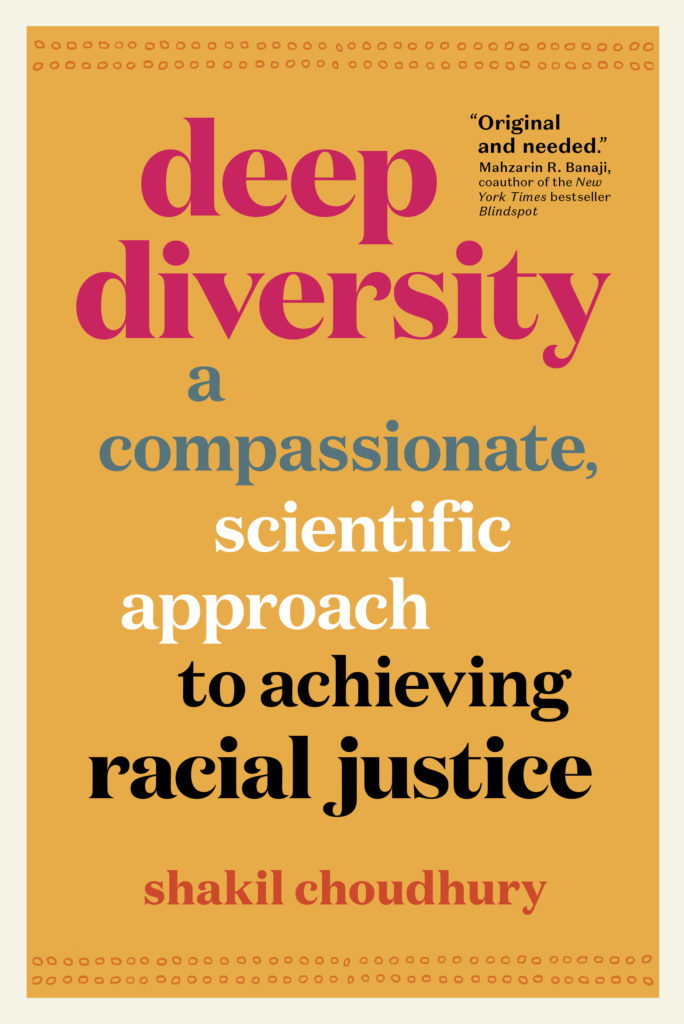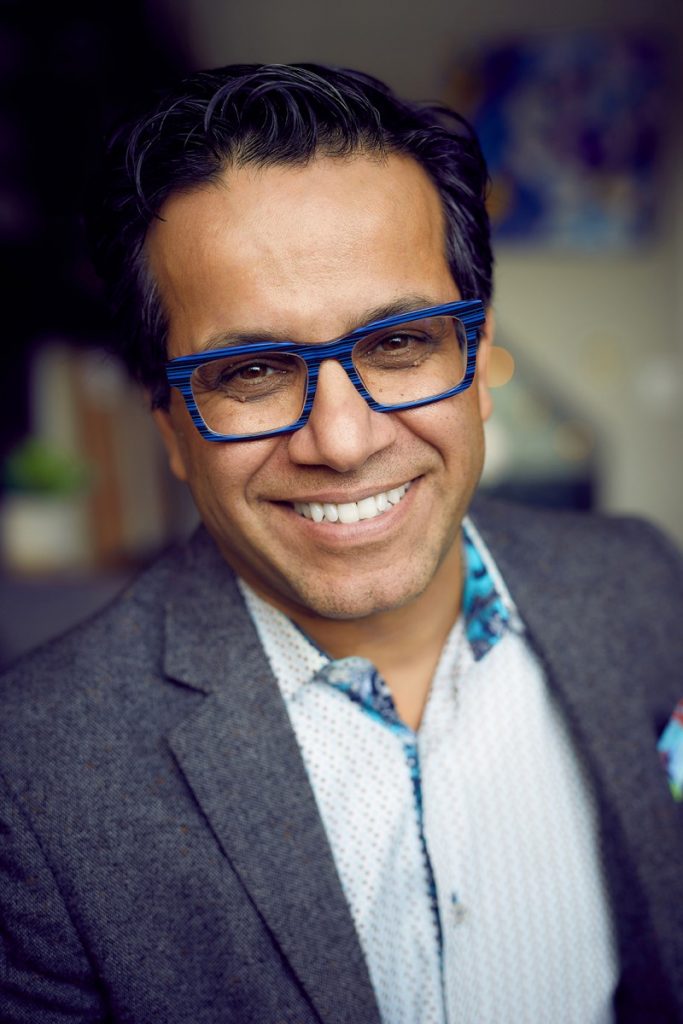By Roger Ali October 12, 2021

Deep Diversity: A Compassionate, Scientific Approach to Achieving Racial Justice, Shakil Choudhury, Greystone Books, September 28, 2021, 240 pp., $32.62
In Deep Diversity, Shakil Choudhury seeks to reframe the issues of racism, specifically systemic discrimination, in a practical, scientific, compassionate manner. This book is an encouragement for readers to be system thinkers about race and identity issues, the “us versus them” mindset, and work towards breaking unconscious, implicit bias.
Choudhury’s work stems from the four traditional approaches to alleviating racism: multiculturalism, cross-cultural communications, the business case for diversity, and the anti-racism and anti-oppression or ARAO framework, the anti-racism/anti-oppression approach being the most challenging and contentious of the four.
But in Deep Diversity Choudhury explores other schools of thought about racism, integrating research and strategies from emotional intelligence, social psychology, neuroscience, and implicit bias, as well as meditation and mindfulness. He believes we must first understand how central racial identity and discrimination is in the conversation to tackle the all-important “us versus them” dynamic and how emotions, bias, identity, and power all influence the construction of racism.
The influences of emotions
Choudhury describes emotions and behaviours in the context of racial difference. He believes that, whether we are aware of them or not, feelings are the root of our actions He says building up inner skills—self-awareness, meditation, self-regulation, empathy, self-education, relationship management, conflict skills, and meaning-making—can enhance positive relationships with ourselves and others.
To understand the unconscious and automatic nature of emotions as they are relevant to issues of racial difference, Choudhury talks about “tilting towards/away,” “emotional contagion” and “emotional triggers.”
In our choices of where, and with whom, we live, work, and play, he says we generally “tilt toward” those most like ourselves while “tilting away” from those who are different.
Along with an endemic tilt in our choices, there are “emotional contagions” whereby those who are emotionally dominant can transfer their mood to others without being aware of their actions. We take many of our cues from those in charge. Leading authentically means being aware of self and knowing what words and reactions mean.
He also says, “emotional triggers,” can activate the flight-freeze response, reducing our ability to think clearly, especially when dealing with those who are racially different from us.
Choudhury encourages self-compassion to help soothe the voice of the inner critic that judges harshly and tends to dwell on errors and missteps, preventing us from moving forward.
Self-awareness and mindfulness meditation are skills to develop in ourselves and cultivate attentiveness to our own emotions and feelings without reacting or judging. He reminds us to “practice, rinse, repeat.”
The influence of bias
If you’ve ever wondered why you formed a belief or an opinion about someone or a particular group, your belief may be based on a kernel of truth or an exaggerated reality or can even be a lie. This form of unconscious prejudice is known as implicit bias, the second component in the Deep Diversity model. Shakil Choudhury defines implicit bias as a hidden or unintentional preference for a particular group based on social identity such as race, gender, class, ability, or sexual preference. He provides a scientific explanation of how the brain takes neurological shortcuts that can lead to errors in judgement. As someone who has experienced discrimination on several occasions, I believe the beholder sees certain things and misses others, depending on the focus of their unconscious mind. The classic example is judging an immigrant, like me,
by my name as someone who is poorly educated with poor English skills. We all have implicit biases and tend to be unaware of them.
Backed by scientific examples, the book looks at strategies to help minimize bias by upgrading our pattern recognition skills such as role models, inner motivation, noticing personal contradictions, intergroup contact and friendships, counter-stereotype plans, power of curiosity, and education and training. For those who are committed to the journey of unlearning old habits and beliefs, self-regulation is the place to start.
Choudhury’s prompting might encourage a senior executive to take a second look at a brown employee who seems unable to advance their career and may be affected by system-wide racial bias rather than an accurate reflection of the employee’s abilities.
The influence of identity
The mass riots and public outcry for justice and racial equity after the tragic death of George Floyd exemplifies the third component of the unconscious mind: identity—protecting the interests of our own group and its members. Choudhury says, “the ‘us versus them” formatting of our neural wiring happens quietly and automatically deep inside the brain.” If other races do not play a major part in our day-to-day existence, neural connections do not form early on. According to a theory of social identity—the dynamic of individuals, their identity and behaviour, in relation to social groups—is a vital driver of human behaviour, both on conscious and unconscious levels.
The influence of power
Understanding the imbalance of power, we can begin to understand more fully the interplay of identity and racial dynamics in groups we belong to, says Shakil Choudhury believing that the skill of empathy starting with deep listening and curiosity, both for us and for the person or group with whom we are interacting, that empathy functions in tandem with self- awareness, mindfulness, meditation, and self-regulation.
Choudhury explains that power determines who is centred and who is not, and who gets defined as “us” or “them.” Using research by renowned scholars Felicia Sidanius and Jim Pratto, he introduces social dominance theory to underscore how the patterns of privilege and power create dominant and non-dominant groups with different realities. He considers five factors—individual discrimination, institutional discrimination, psychological distortions, self-destructive behaviours, and cultural myths—to help expand our racial pattern recognition framework.
Approaching situations from this angle of power dynamics may help prevent racial interactions from always being reduced to the individual level.
Incorporating Arnold Mindell’s work on social and personal power, which rank describes how influential someone is in the hierarchy of a group, Choudhury explores other approaches to power. He introduces Mindell’s model of access to both social and personal power, and according to Choudhury, vulnerability, truthfulness and listening to another person’s perspective is the basis of conflict competence.
“To make meaning, we need to find constructive life lessons in adversity,” Choudhury says and that we can use the concept of Deep Diversity to make constructive meaning of race, diversity, and our vast differences. He is saying to ask you to ask yourself the questions, “why did the situation happen” and “what good came of it?”

Part of me just wants to go back to bed
Choudhury may have broadened the views of what undergirds racism in Deep Diversity in a holistic and satisfying way, but he still suffers its devastating effects.
Deep rooted issues of white supremacy and segregation support the foundation of his explanation for why power is a force that divides us. “This fuels my anger and helplessness. Part of me just wants to go back to bed,” he says.
I share Choudhury’s pain of heaviness, realizing how big the problems of racism, discrimination, and oppression are. Choudhury has written a book that very much resonates with my own experience of how emotions play a crucial role in our actions in the “us versus them” dynamic.
His example of the massive influx of South Asians to Brampton in the 1990s to illustrate the influence of bias particularly resonated with me. A tendency to misjudge members of a racial group, treating them unfairly, specifically in hiring for leadership roles, is also something I’ve experienced, and understanding we need awareness of both our inner, psychological world and our outer realities to better understand oppressive systems like racism.
His theory of how our social identities is heavily influenced by culture—and our way of being, thinking, and acting that we learn from our environment is—totally relatable. He recommends self-education to help expand our racial and psychological pattern recognition.
I was reminded of the need to understand the important difference between quick judgment and a more thoughtful evaluation, skills in which Choudhury recommends we invest in developing—discernment, relationship management and conflict competence.
As a nonprofit professional, and volunteer director, my plea is that we genuinely seek to unlearn the behaviours, and conscious and unconscious actions, that contribute to racism. The questions and suggestions Shakil Choudhury identifies throughout the book are a good place for any reader to be the change you wish to see in the world. Wherever you are on your journey, Deep Diversity offers a clear yet compassionate perspective for seeing the world we live in, how racism shows up in ourselves and society and what we can do to help dismantle racial injustice in our personal and professional lives.
Roger D. Ali, MBA, C. Dir., is a recognized nonprofit leader and a book reviewer of The Charity Report since 2019 @fundraiseroger
More reviews from Roger Ali
Effective Fundraising: Let’s Talk Boards September 3, 2021
Saga Boy: Beautiful, raw, and searching June 11, 2021
Covid-19: The Pandemic that Never Should Have Happened November 20, 2020
Diversity Inc: How the diversity industry is thriving, even if diversity itself is not September 7, 2020